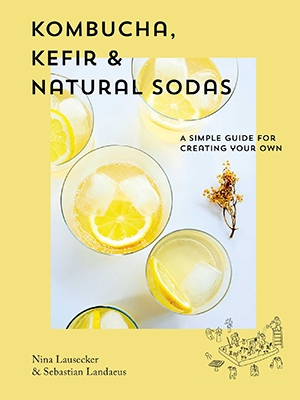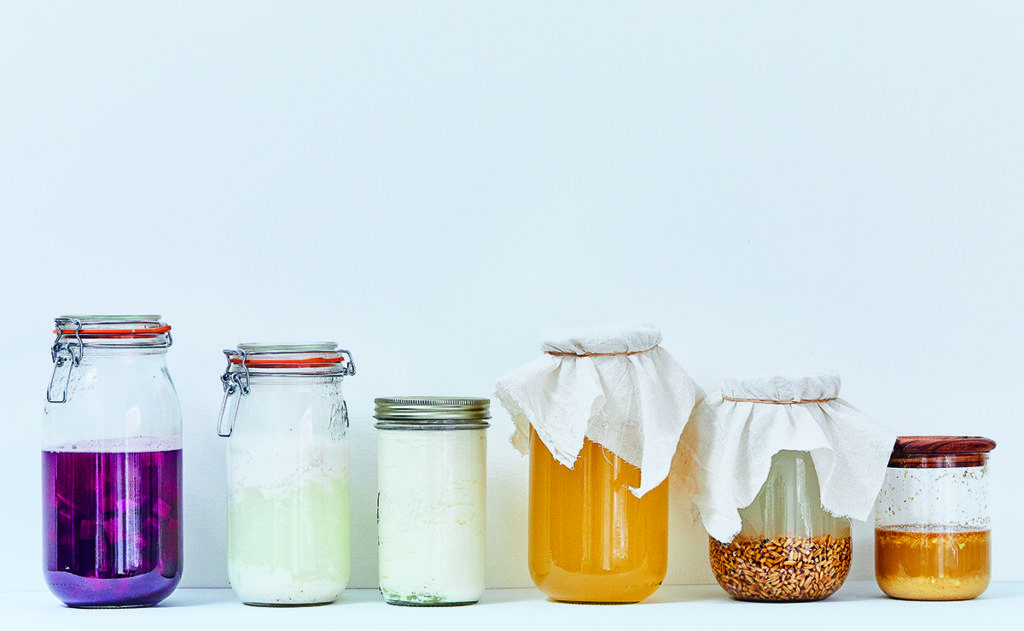Fermentation is often cited as the key to maintaining a healthy microbiome – but what is it and how does it work?
With so much new research revealing the link between our gut (and the bacteria that live in it) and our physical and mental wellbeing, it’s more important than ever to have a healthy digestive system. One of the easiest ways to do that is by introducing fermented, probiotic foods and drinks into your diet.
This extract, from the book Kombucha, Kefir and Natural Sodas by Nina Lausecker and Sebastian Landaeus, explains the health benefits of fermentation.
So … what’s the link between fermentation and health? Bacteria, that’s what! They’re everywhere, from the start of the fermentation process to the insides of our stomachs during digestion.
Bacteria are responsible not only for digesting things inside our intestines, but also things outside of them. Bacteria aren’t happy simply breaking down our food for digestion, they also reduce it into molecules that are more easily absorbed by our bodies: this is called bioavailability.
Besides that, the microbial community makes vitamins, breaks up toxins and medicines, and strengthens our immune systems. And all those things are a big plus for our health!
The stomach, our second brain
Just as Giulia Enders tells us so brilliantly in her best-selling book The Subtle Charm of the Intestine, we humans are inhabited. Yes, it’s true! And not by just anyone, thanks very much. Our intestines play host to around 100 trillion bacteria (or about 2 kg/4 lb 6 oz of the average adult’s total body weight). Today, some scientists even consider our gut microbiota to be an independent organ.
So, more than 95% of the bacteria on our planet are harmless to humans. And a significant number of them are actually some of our best allies because they protect our gut, gathering in the exact places where pathogenic agents would like to do us harm.
All the microorganisms that populate our digestive tract are known as ‘intestinal flora’ or microbiota. Intestinal flora act like a barrier in our intestines and protect us from external attacks.
Scientific research has also shown that a healthy gut positively influences not only our immune system but also our mental health. That’s why the term ‘second brain’ is increasingly used to refer to the stomach – or, more precisely, the gut, which reports directly to the brain on matters that are top secret and greatly affect our subconscious. Fascinating!
Did you know? Back when we still didn’t know much about bacteria, we classified them as part of the plant kingdom – hence the name ‘intestinal flora’. The term ‘flora’ might therefore not be exactly right, but it does allow us to imagine what we’re talking about. From a scientific perspective, if we’re being precise we should talk about microbiota – from the Greek words for ‘small’ and ‘life’ – to describe the population of microbes living inside us.
Endangered Microbiota
We need to realise that in this day and age, the balance of our gut flora is constantly endangered, in great part due to our hygiene-conscious tendencies. Unfortunately, when we imagine the microorganisms contained in food, the first that come to mind are disease-causing ones.
We consume too many antibiotic or antibacterial products, we overdo it with the disinfectant and, at the same time, through pasteurising all of our foods, we don’t leave any room for bacteria to thrive.
Only now are we starting to understand that it’s not in our interest to exterminate every single bacterium. The key is to find a healthy balance between a sufficient quantity of good bacteria and a non-dangerous amount of bad bacteria: it’s an intelligent way to protect ourselves from true danger and to encourage beneficial bacteria in a targeted manner.
A clear conclusion can be drawn from our actions over the last few decades: species of good bacteria are disappearing and researchers believe that their extinction is linked to current epidemics of obesity, inflammatory disease, digestive pain and even Alzheimer’s.
For all these reasons, the problem of gut flora imbalance occurs too frequently these days and many of the people affected haven’t even made the connection between cause and effect!
This imbalance affects everybody differently. The main symptoms are: constipation, bloating, abdominal pain, food intolerances or allergies, nutritional deficiencies, fungal infections, skin problems, hormonal disorders and mild mental disorders (lack of concentration, anxiety, depression), etc.
Did you know? Intestinal flora starts to breed from the moment we are born and is unique to each individual and his or her way of life. This influence starts from birth: the microbes our mothers had, whether we were born vaginally or via caesarian, whether we were breast-fed or not, our environment (town or country), our surroundings (pets), our food (raw or pasteurised), the levels of cleanliness to which we were exposed (too disinfected or not disinfected enough), the medical treatments we were given (unnecessary prescriptions of antibiotics) and the microbes with which we came into contact (travelling, etc.).
Strengthening gut microbiota with microorganisms
As we were saying before, nowadays scientific discovery after scientific discovery are proving the extent to which bacteria are essential to us. Thus, maintaining our gut microbiota can help to improve our health.
This maintenance consists of providing the bacteria that already exist in our gut with prebiotics that feed them, plus a few probiotics to give them a bit of help from time to time. Bacteria are at their most beneficial when they’re at their most diverse.
The benefits of probiotics
We can care for our gut microbiota by eating small quantities of fermented food each day – thus enriching it with other populations of microorganisms. Fermented foods help the gut to retain sufficient quantities of friendly bacteria to protect us should a rogue pathogen try to colonise our organs.
However, it’s important to understand that the microorganisms in our diet won’t necessarily settle permanently in our intestines. These days, probiotics are a treatment more than a cure.
After taking a course of antibiotics, it’s better to repopulate your intestinal flora rather than to leave that space vacant. That’s what probiotics are for: they help the intestine to rebalance after the dangerous microbes have been eliminated. When we stop taking them, it’s up to our gut flora to keep us safe.
The right balance
You don’t have to be swallowing capsules every day to get probiotics into your body. By varying the fermented products in your diet (drinks, vegetables, yoghurt, etc.), you can ingest beneficial microorganisms from natural sources.
Fermented foods offer a wealth of health benefits, but they’re most effective when consumed in small quantities and often. You shouldn’t overdo it; instead, make sure you eat a varied and balanced diet containing raw, cooked and fermented foods (just a little of the latter every day is enough).
By all means dive into fermentation and become an expert on the subject if you wish, but remember that a diet that is balanced and varied is key to good health.
Gradual introduction
If you’re completely new to fermented products, start introducing them into your diet gradually. They are full of bacteria, so suddenly flooding your digestive tract with them could have unwanted side-effects. The best thing to do is to increase the doses little by little. Start with half a small glass per day. Once your body has become used to this, keep increasing the quantities until you start to feel the benefits of what you’re drinking.
The benefits of fermentation
- It helps digestion.
- It increases enzyme production.
- It’s a source of vitamins.
- It stimulates gut flora.
This is an extract from Kombucha, Kefir & Natural Sodas by Nina Lausecker & Sebastian Landaeus (Simon & Schuster). RRP $35.00 Out Now.












